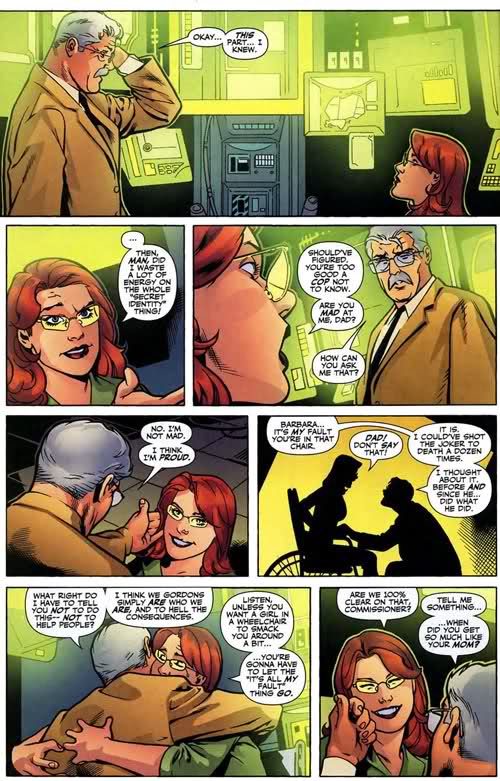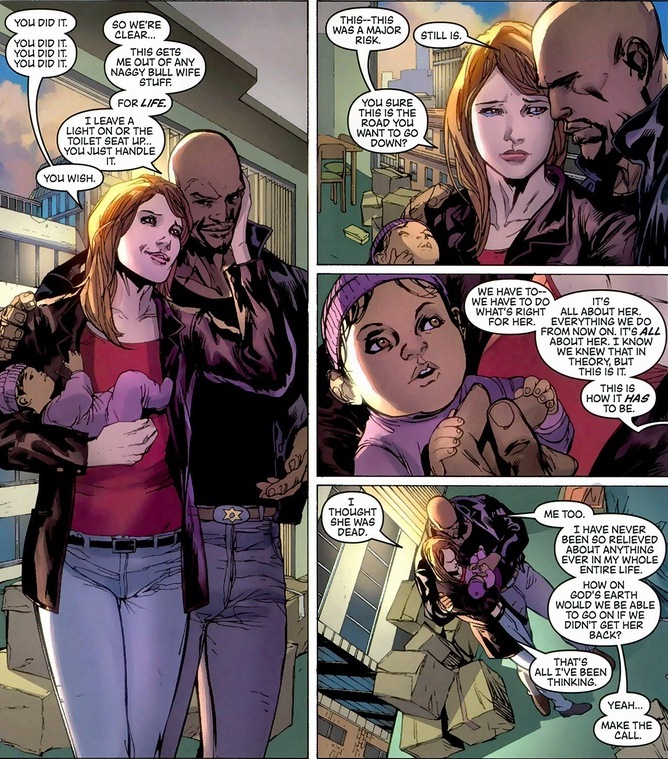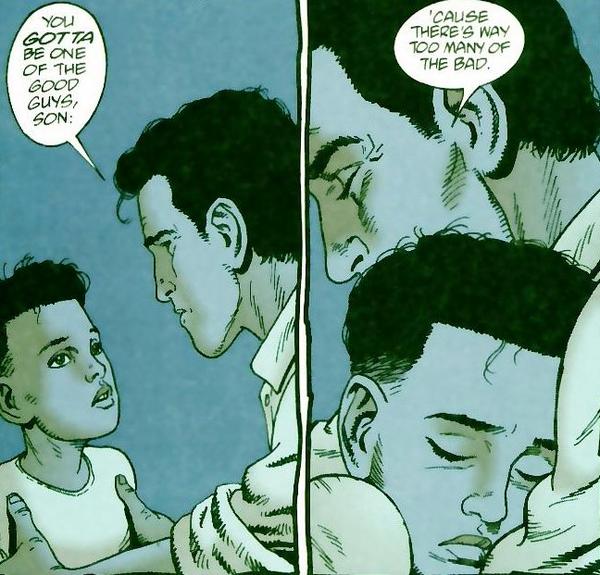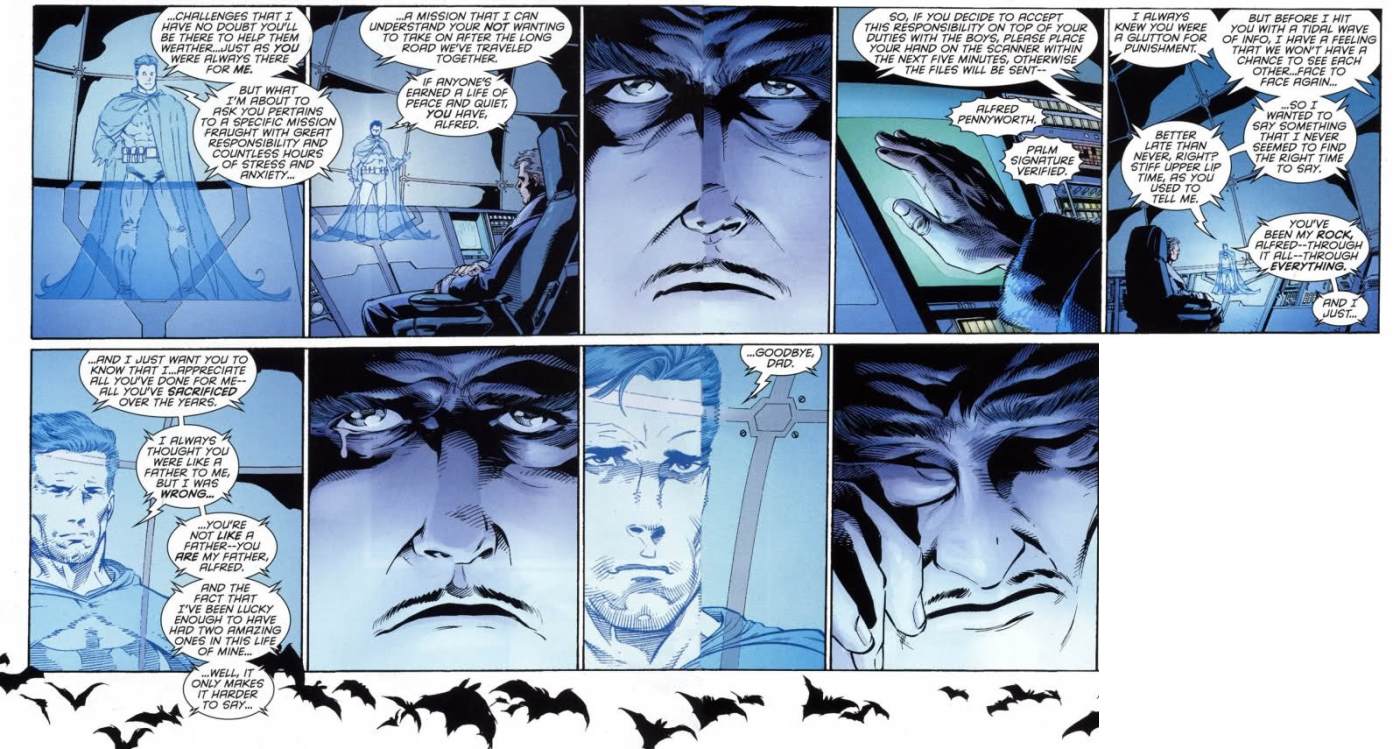Mild-mannered reporters by day, Greg Phillips and Nick Duke share an intense love of comic books that has made them the Hard-Traveling Fanboys. And if there’s anything that fanboys love, it’s debating what book is better than another book or which character is “cooler.” Enter Countdown, a monthly column where Greg and Nick will give a top five list and debate the merits therein.
Nick: After a lengthy delay due to a combination of childbirth, automobile accidents and sheer laziness, we are very pleased to welcome back our readers to that very special corner of cyberspace occupied by us, the Hard-Traveling Fanboys.
Greg: We are back with another edition of Countdown (we’re still waiting on our checks for that incredibly original title, Vince). Fathers Day may be in the rear view mirror, but that doesn’t mean we can’t celebrate it right here in the Internet pages of this column. And thus, this month’s Countdown theme is Comic Book Dads. Now, for the purposes of this, and because most comic book dads are either dead or horrible parents, we’re expanding it to include surrogate or stand-in fathers as well. For instance, people like Ben Parker, Alfred Pennyworth and Charles Xavier are very much in play.
Nick: Indeed they are. Here’s hoping yours truly can turn out to be a better father than Slade Wilson. In any case, let’s see Greg’s No. 5.
Greg’s No. 5: Wally West
Nick: I’m not all that familiar with the non-DC Animated Universe version of Wally West, so I’ll let Greg wax poetic on the parenting skills of the man who took up Barry Allen’s mantle.
Greg: Wally doesn’t make my list as much because of what he did as a parent, but rather what he had to go through just to become one. Let’s see, there was the whole decade of comics dealing with his relationship with Linda Park and all their various trials and tribulations. Then there were the evil machinations of Hunter Zolomon and the long-lasting physical and emotional toll he took on the Wests. And then there was the whole “erasing the knowledge of Wally’s secret identity” thing.
But through it all, Wally supported Linda and made sure he was going to be there for their twins, Jai and Iris. That’s right, Wally’s first foray into the parenting world saw the birth of twins, and super-powered twins at that! The number one goal of a father is to protect his children, and Wally did just that by escaping with them into the Speed Force, temporarily leaving the DCU behind.
Subsequent stories dealt with Wally’s fatherhood, the struggles associated with trying to hold down a job while training two super-aging kids how to be heroes. Oh, and maintaining a marriage the whole time. It was great, heady stuff for the superhero genre, and Wally consistently showed how much he loved his kids (even if they were kind of bratty).
Nick: Yes, I remember Wally’s disappearance into the Speed Force, though I don’t remember much of what followed and how that changed his family life.
Greg: Basically, the twins started aging really quick and Wally had to deal with them being in the “terrible twos” while in older bodies. Not a good combination for a parent.
Nick: That sounds like an…interesting version of the father/child dynamic.
Nick’s No. 5: Batman/Bruce Wayne
Greg: Our first non-biological father on the list and, perhaps, our first controversial choice as Batman’s parenting skills have been called into question in the past.
Nick: Now, if we were doing a countdown of the worst comic book dads, it’s entirely possible that Bruce Wayne might find his way onto that list as well. Bruce definitely has some damning flaws as a father figure, but he also has plenty of positive qualities as well. I think it’s that imperfection and his obvious flaws that make me appreciate him as a father figure. Perfect dads are hard to come by in the real world, but there are plenty doing the best job they know how. To me, that’s Bruce.
Greg: On the positive side, he’s taken in two orphans and two other young boys and molded them into good, valued individuals. On the downside, his “children” have about a 50 percent chance of being brutally murdered. There’s a give-and-take, for sure.
Nick: Bruce’s parenting skills are fascinating because of his four “children,” he has very different relationships with each. Dick represents the relationship between a father and his adult son, in which the relationship has blossomed, soured and come through on the other side stronger than ever before, if not irreversibly different. With Jason Todd, there’s the one thing the child can’t quite forgive, yet Bruce continues to try to get through to him. With Tim, it’s a relationship where Bruce sees too much of himself, both his brilliance and his obsessions. And with Damian, it’s the feeling many fathers who have lost too much time with their sons have — he’s desperately trying to make up for the years he’s lost, and perhaps trying too hard at times.
I’ll argue that trying to protect your children and failing doesn’t necessarily make you a bad father. And, in the case of Jason, Bruce’s failures only served to teach him a lesson and in the end made him a better father and a better man.
Greg: I’m not sure Bruce handled Jason’s death in the best way or took the right steps afterward. Continually putting teenage boys out on the front lines of a dangerous war on crime seems a bit thickheaded.

But I think what separates Bruce from the litany of terrible fathers like Magneto and Deathstroke is his heart. He truly has the best of intentions with all of his sons, and he is committed to giving each of them what he never had past his early youth — a guiding hand. He takes that way too far in many instances, and in others he comes off too distant or cold (as many fathers do in real life), but his heart is in the right place. And when he’s “on” as a parent, he’s really on. Some of my favorite scenes in comics are heart-to-hearts between Bruce and Dick. Longtime Batman/Nightwing/Robin writer Chuck Dixon did a great job with this element in the late ’90s and early 2000s.
Nick: Handling something in the best way and handling something in the best way you know how are rarely the same thing. I can’t imagine the pain losing a child would actually cause, and I can certainly understand the mentality of being angry at the world. But, as I said, he eventually came through the other side, and was a wiser man for the experience.
Greg: This is true, and the importance of that loss is something he never forgot, as was illustrated beautifully in the end of the Judd Winick story “Under the Hood.”
Greg’s No. 4: Jim Gordon
Nick: I love this choice, as Jim Gordon might be the best example of a flawed, yet ultimately loving and endlessly devoted father,
Greg: Jim Gordon is one father who has truly been through the wringer. He’s gone through a bitter divorce, watched his daughter get paralyzed before his eyes and, later, dealt with the same man who shot his daughter do the same to his new wife, this time killing her.
Yet despite all that tragedy, all that loss, Commissioner James Gordon has stood tall as the proud father of Barbara Gordon. He’s been there through all her own trauma and personal demons, doing his best to balance the rough-and-tumble life of a Gotham police officer with the duties of a father. He has no idea the personal danger his daughter in which his daughter puts herself every night as Batgirl or Oracle, but he does get a sense of her fiery personality. When trying to protect her, he often has to fight a war on two fronts — against the threat and against her own stubborn arguments.
But the love between Barbara and Jim simply feels more authentic than most parent-child relationships in comics. She adores her dad and sees in him what she would like to one day become. On the other hand, Jim sees his daughter as a shining light in a city overcome with dread. The Commish will do whatever it takes to keep his daughter safe, and he’ll do it without once complaining or asking for thanks. That’s what dads do.
Nick: Extremely well said, sir. More on Jim Gordon in a bit.
Nick’s No. 4: Luke Cage
Greg: Ooh, an interesting choice. I have to admit, I haven’t had much exposure to Luke’s skills as a pop.
Nick: Luke’s a fairly recent addition to the world of fatherhood, as he and Jessica Jones’ daughter Danielle Cage was introduced roughly a decade ago. Since that time, Luke’s priorities have definitely shifted, as he has gone from placing his heroic life and his stewardship of New York City as his top priority to making sure that his wife and daughter are provided for and protected first and foremost.
Greg: I wouldn’t want to be the guy who eventually tries to date his daughter, that’s for sure.
Nick: When the Civil War broke out, Luke knew he had to fight the registration movement. But not before sending Jessica and Danielle to a safehouse in Canada. The events of Civil War instilled a deep sense of distrust in Luke, a distrust that only increased as Secret Invasion began. However, despite his personal desires to see the Skrulls defeated, he again provided for his wife and daughter first by putting aside his grudges with Iron Man in order to earn them a place at Avengers Tower where they would be safe and secure. When Danielle was kidnapped by a Skrull Jarvis, Luke made a deal with the proverbial devil, agreeing to assist Norman Osborn during Dark Reign in exchange for information to enable the safe return of his daughter.
The point of all that is this: Time and time again over the last decade, Luke has made the safety and wellbeing of Danielle Cage his top priority. No team affiliation, political stance or even sense of right and wrong can come between Luke and that pursuit. One can relate.
Greg: Again, that’s the hallmark of being a father — the child comes first.
Greg’s No. 3: Ted Knight
Nick: My only exposure to this character came during the first Starman omnibus, which we reviewed in Longbook Hunters a while back. I’m interested to hear more.
Greg: No, I’m not referring to the longtime character actor of the same name (though I did love him as the main antagonist in “Caddyshack”), but rather to the original Starman and the father of ’90s Starman Jack Knight.
We’ve written about Ted and Jack in The Longbook Hunters, and one of the things we brought up in that column was the unique father-son dynamic between the Knights. When it comes to flawed fathers, Ted is right at the top of the list. He often neglected his family during his prime years in favor of costumed adventures alongside his buddies in the Justice Society of America. He took more to Jack’s brother, David, because they shared a love of superheroics, while Jack preferred comic books, artifacts and generally geeky hobbies (not that we’d know anything about that).
As a result, Jack naturally grew to resent his dad, while his dad did nothing to reverse that trend, continually criticizing Jack’s decisions and reluctance to embrace the family legacy.
Ironically, it’s David (in death) who ends up bringing the two together and forging a truly touching relationship between an aging dad who has finally accepted his own mistakes and a maturing son who is finally ready to forgive. Throughout the Starman series, Jack grows to realize all the life lessons he’s learned from his dad without even realizing it. Likewise, Ted watches Jack grow and mature into a better, more compassionate hero than he ever was. That moment, somewhat early in the series, where Ted finally tells Jack he’s proud of him and he loves him — goosebumps, man.
Nick: It certainly has some real-life parallels for people of our geeky persuasion.
Nick’s No. 3: Jim Gordon
Greg: I’ve already given some thoughts on Gotham’s greatest cop, so I’ll let you talk about one of your favorite characters and his relationship with Barbara.
Nick: Not much to say here, as Greg pretty much nailed it in his brilliant assessment of the relationship between Jim and Barbara.
As was mentioned earlier, Jim has had to see his daughter go through pure hell, and he had to stand by, unable to do anything to restore his daughter’s ability to walk or erase those painful memories from her mind. Yet, through all that, rather than being angry at the world or brooding over his inability to protect her from the Joker, Jim just kept putting his best foot forward and tried to be the best dad he could.
On the topic of Barbara’s career as Batgirl, I’ve always looked at the relationship like this: My favorite interpretation of Batman’s relationship with Jim and the “Does he or doesn’t he know his secret identity?” question, I’ve always believed that Gordon knows, but doesn’t allow himself to dig too deep so as to maintain plausible deniability. However, with Barbara, I feel as if Jim is only ignorant of his daughter’s crimefighting career because he is so blinded by his love for her. The evidence is apparent, but it seems to be a case of being unable to see the forest for the trees.
All in all, the Gordons’ relationship is a great example of how fathers can be their child’s biggest hero, no matter how many mistakes they make.
Greg’s No. 2: John Custer
Nick: A father that is rarely seen in the work from which we know him, but one that leaves an indelible impact on the main character and the story itself.
The best thing I can say about John Custer is that I wish I knew more and had seen more of John Custer. He seemed to be a genuinely good guy, but not in the Pa Kent vein of good guys. Custer’s the kind of good guy that would find humor in a lighter emblazoned with “Fuck Communism.”
Greg: A lighter he would pass on to his son, Jesse, as a memento that would last throughout his life.
One of the themes prevalent throughout Garth Ennis and Steve Dillon’s Preacher was a seemingly simple question — what makes a man? John Custer was a man’s man. A decorated war hero who was treated like anything but, Custer fought for everything he had in life, not the least of which was his family. Dealing with his own hangups about fighting a war (Vietnam) he didn’t understand, he nonetheless served as an inspiration to his friends and fellow soldiers. Stateside, he carried himself with class and dignity even when being spat upon and called hateful names by his future wife.
And in the end, he died trying his best to protect his wife and young son from a family of murderers. But in the short time that Jesse Custer knew his dad, he learned many valuable lessons from him — the importance of family, dignity and treating people with respect. Much of Jesse’s journey would, in some ways, mirror his father’s earlier path. Jesse tries to hold himself to the standards set by his dad, who truly taught more through his actions than through his words.
But it’s his last words to Jesse that stand out to me: “You gotta be a good guy, Jesse. You gotta be like John Wayne: you don’t take no shit off fools, an’ you judge people by what’s in ’em, not how they look. An’ you do the right thing. You gotta be one of the good guys, son, ’cause there’s way too many of the bad.”
Nick: Beautifully stated, sir.
Nick’s No. 2: Ben Parker
Greg: Though he’s affectionately known as Uncle Ben, he is the one who really raised Peter Parker and instilled upon him the values that would guide the Webhead’s life.
Nick: Much like John Custer, Uncle Ben is more fondly remembered for the lasting impact he had on Peter Parker than he is for anything we actually saw him doing. The legacy of Uncle Ben and his words “With Great Power Come Great Responsibility” gave the Marvel Universe perhaps its greatest hero, and when Peter has been in the deepest valleys of self-doubt, it’s the memory of Uncle Ben that keeps him going.
But, to be fair, the actual instances of seeing Uncle Ben in the 616 Universe are scarce. We’re led to love the man more on his legacy and his lasting impact than his actual actions. As with most things Webhead, it’s the Ultimate version of the character that led me to develop my deep love and admiration for Uncle Ben.
Ultimate Uncle Ben is portrayed as a bit outdated in his appearance and actions, yet that unmistakably 60s attitude provides him with a lot of his charm. He believes in peace and acceptance, yet isn’t afraid to take action when necessary. Even when he scolds Peter and publicly embarrasses him by showing up at a party Peter is attending, he does so in an effort to get Peter to snap out of a funk that Ben can tell Peter has been in since the iconic spider bite. However, as the tale goes, it isn’t until Ben dies that Peter does snap out of it and realize what he has to offer the world. Ultimately (no pun intended), it’s this version of the character that really showed the world what Ben Parker was all about. He was only around for a handful of issues, but it was easy to see why Peter loved him so. And when it came time for Peter to give the ultimate sacrifice, Mark Bagley treated us to a tearjerking variant cover that saw Ben putting his arm around Peter, congratulating him on a job well done and the reunited duo walking into a white light.
Greg: One of the things Brian Michael Bendis expertly captured in the early issues of Ultimate Spider-Man was the way so many of us mistreat our parents during our teenage years. Raging hormones, existential crises and the perils of high school life often led me to outbursts toward the easiest targets, who were my parents. Bendis manages to encapsulate that in his story and also show how singular events can change our perspectives and make us realize the power of our words.
Nick: And through all the hurtful things Peter says and does, Ben never lashes out at Peter in retaliation, but shows an enduring patience and desire to help guide, rather than judge.
Greg: But when it comes to patient, guiding hands, one father stands above the pack for me.
Greg’s No. 1: Jonathan Kent
Nick: Pa Kent has to be the most popular choice for best comic book dad, and it’s easy to see why. He’s responsible for raising perhaps the most noble, honest and greatest hero of them all.
Greg: When making my list, there was only one certainty: Jonathan Kent would be at the top.
Pa Kent is such a good dad that he makes readers wish he were their own, or at least wonder what it would be like to have him as an uncle. Sure, he has to deal with problems, more than most could handle — the pain associated with being an adoptive parent who must watch his child yearn for a connection to his biological parents, the everyday struggle to conceal his son’s gifts from a world that would prey upon him, and the necessity of teaching Clark Kent how to control his sometimes-uncontrollable powers.
Yet through it all, Jonathan maintains a composure that undoubtedly shapes the heroic poise Clark eventually adapts as Superman. Jonathan teaches Clark how to use his powers, but he also teaches him WHY to use his powers. He is the one, along with his wife, Martha, responsible for the moral code and inherent goodness that makes Superman the most inspirational figure in the DC Universe. As readers, we’ve been treated to more emotionally powerful father-son chats between the Kents than I can even count. Yet each one feels important to the mythos.
I have always found myself more attached to Clark Kent than Kal-El, and one of the key reasons is the influence of Pa Kent on both Clark the man and Superman the hero. Whether motivating his son in death or standing by his side in life, Jonathan stands as an inspiration to parents in the same way his son stands as an inspiration to readers of all ages.
Nick’s No. 1: Alfred Pennyworth
Greg: OK, so this might be seen as a bit of a cheat — after all, Bruce Wayne had a real father for the first, what, 10 years of his life? But make no mistake, it’s Alfred Pennyworth, the faithful butler, who has become Bruce’s dad over the years. Always willing to call out “Master Bruce” when necessary (something Batman desperately needs in his life), yet always there with a shoulder to lean on, Alfred is the rock in Bruce’s life. He’s the one constant that he can always count on to be there.
Nick: Indeed, it’s Thomas Wayne that Bruce constantly mourns and served as the inspiration for his superheroics, but when we talk about who helped shape both adolescent and adult Bruce into the man he needed to be to become the Bat, the credit has to go to Alfred Pennyworth. Alfred and Bruce both suffered greatly at the loss of the Waynes, and in that pain, found a deeper kinship with one another. At some point, that relationship transformed from a master-servant dynamic to a father-son one. When Bruce finally returned to Gotham after his long sojourn, it was Alfred who celebrated his return the most. Even if it was never explicitly stated, it was Alfred viewing Bruce as the prodigal son returned. Since then, Alfred has seen the change in Bruce – the single-minded determination to place the mission above all else. However, Bruce’s love for Alfred has often served as the one thing that grounds him and reminds him of a life outside the cape and cowl.
Greg: Bruce naturally intimidates everyone in his life — his “kids,” his lovers, even his friends. But he never intimidates Alfred, who has stepped up on more than one occasion to show Bruce a different way, a better way, to accomplish his mission.
Nick: Yes, Alfred has helped to save Bruce from himself on numerous occasions and has even served as a wonderful grandfather, both in terms of helping Bruce to connect with his adopted sons and helping the various Robins to understand Bruce’s point of view even when he is at his most distant and cold. Finally, I’ll end with this. There wasn’t much positive that came out of Batman R.I.P. However, one beautiful scene came in Batman #678, when Superman and Wonder Woman arrive at Wayne Manor to present Alfred with the cowl that Bruce was wearing when he died. When Superman asks if Alfred is all right, Alfred responds, “Am I ‘all right’? No, sir. I am not. My son has died.” Heartbreaking.
And with that, ladies and gentlemen, that brings this week’s Countdown to a close.
As always, we welcome your feedback on Facebook, Twitter (@gphillips8652 and @nickduke87) and on our PTB email accounts (GregP@placetobenation.com and NickD@placetobenation.com). Let’s hear your favorite comic book dads!










